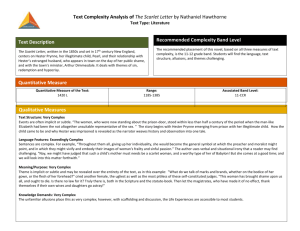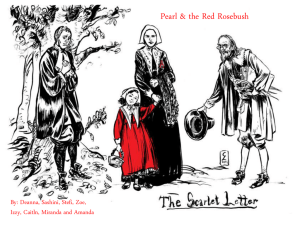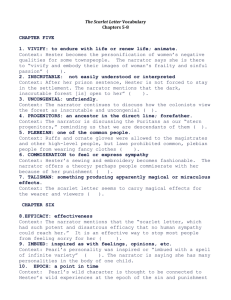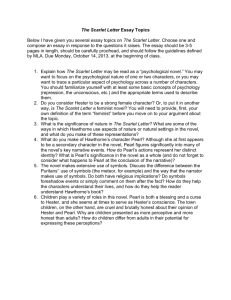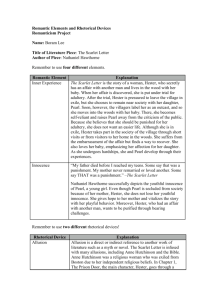HESTER PRYNNE WENT, one day, to the mansion of
advertisement
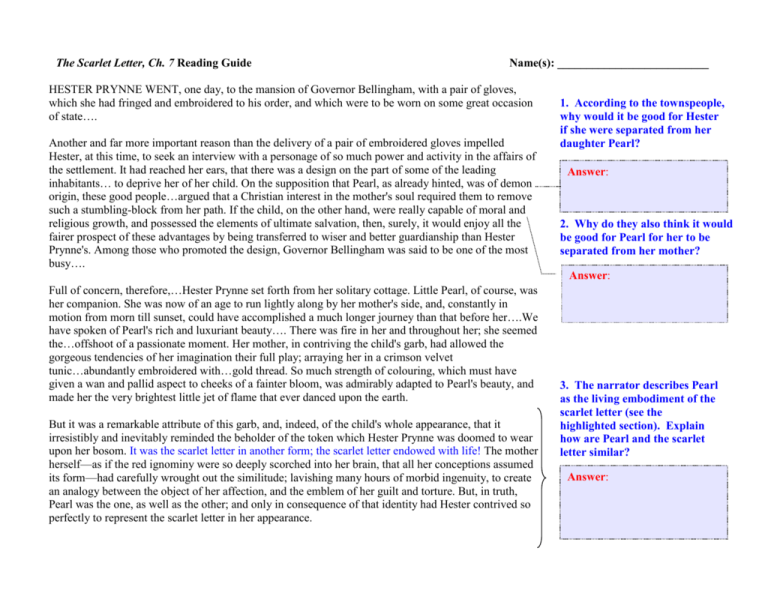
The Scarlet Letter, Ch. 7 Reading Guide Name(s): __________________________ HESTER PRYNNE WENT, one day, to the mansion of Governor Bellingham, with a pair of gloves, which she had fringed and embroidered to his order, and which were to be worn on some great occasion of state…. Another and far more important reason than the delivery of a pair of embroidered gloves impelled Hester, at this time, to seek an interview with a personage of so much power and activity in the affairs of the settlement. It had reached her ears, that there was a design on the part of some of the leading inhabitants… to deprive her of her child. On the supposition that Pearl, as already hinted, was of demon origin, these good people…argued that a Christian interest in the mother's soul required them to remove such a stumbling-block from her path. If the child, on the other hand, were really capable of moral and religious growth, and possessed the elements of ultimate salvation, then, surely, it would enjoy all the fairer prospect of these advantages by being transferred to wiser and better guardianship than Hester Prynne's. Among those who promoted the design, Governor Bellingham was said to be one of the most busy…. 1. According to the townspeople, why would it be good for Hester if she were separated from her daughter Pearl? Answer: 2. Why do they also think it would be good for Pearl for her to be separated from her mother? Answer: Full of concern, therefore,…Hester Prynne set forth from her solitary cottage. Little Pearl, of course, was her companion. She was now of an age to run lightly along by her mother's side, and, constantly in motion from morn till sunset, could have accomplished a much longer journey than that before her….We have spoken of Pearl's rich and luxuriant beauty…. There was fire in her and throughout her; she seemed the…offshoot of a passionate moment. Her mother, in contriving the child's garb, had allowed the gorgeous tendencies of her imagination their full play; arraying her in a crimson velvet tunic…abundantly embroidered with…gold thread. So much strength of colouring, which must have given a wan and pallid aspect to cheeks of a fainter bloom, was admirably adapted to Pearl's beauty, and made her the very brightest little jet of flame that ever danced upon the earth. But it was a remarkable attribute of this garb, and, indeed, of the child's whole appearance, that it irresistibly and inevitably reminded the beholder of the token which Hester Prynne was doomed to wear upon her bosom. It was the scarlet letter in another form; the scarlet letter endowed with life! The mother herself—as if the red ignominy were so deeply scorched into her brain, that all her conceptions assumed its form—had carefully wrought out the similitude; lavishing many hours of morbid ingenuity, to create an analogy between the object of her affection, and the emblem of her guilt and torture. But, in truth, Pearl was the one, as well as the other; and only in consequence of that identity had Hester contrived so perfectly to represent the scarlet letter in her appearance. 3. The narrator describes Pearl as the living embodiment of the scarlet letter (see the highlighted section). Explain how are Pearl and the scarlet letter similar? Answer: As the two wayfarers came within the precincts of the town, the children of the Puritans looked up from their play,—or what passed for play with those sombre little urchins,—and spake gravely one to another:—“Behold, verily, there is the woman of the scarlet letter; and, of a truth, moreover, there is the likeness of the scarlet letter running along by her side! Come, therefore, and let us fling mud at them!” But Pearl, who was a dauntless child, after frowning, stamping her foot, and shaking her little hand with a variety of threatening gestures, suddenly made a rush at the knot of her enemies, and put them all to flight. She resembled, in her fierce pursuit of them, an infant pestilence,—the scarlet fever, or some such half-fledged angel of judgment,—whose mission was to punish the sins of the rising generation. She screamed and shouted, too, with a terrific volume of sound, which doubtless caused the hearts of the fugitives to quake within them. The victory accomplished, Pearl returned quietly to her mother, and looked up smiling into her face. 4. How do Pearl’s actions in this scene characterize her? Answer: ________ Without further adventure, they reached the dwelling of Governor Bellingham… Pearl, looking at this bright wonder of a house, began to caper and dance, and imperatively required that the whole breadth of sunshine should be stripped off its front, and given her to play with. “No, my little Pearl!” said her mother. “Thou must gather thine own sunshine. I have none to give thee!” …So the mother and little Pearl were admitted into the hall of entrance. … At about the centre of the oaken panels, that lined the hall, was suspended a suit of mail…. There was a steel head-piece, a cuirass, a gorget and greaves, with a pair of gauntlets and a sword hanging beneath; all, and especially the helmet and breastplate, so highly burnished as to glow with white radiance, and scatter an illumination everywhere about upon the floor. … Little Pearl—who was as greatly pleased with the gleaming armour as she had been with the glittering frontispiece of the house—spent some time looking into the polished mirror of the breastplate. Mother,” cried she, “I see you here. Look! Look!” suit of mail – a protective outfit similar to what a knight might wear in battle cuirass – a close-fitting breastplate gorget – a collar greaves – armor for the legs physiognomy – the antiquated belief that facial features indicated character “ Hester looked, by way of humoring the child; and she saw that, owing to the peculiar effect of this convex mirror, the scarlet letter was represented in exaggerated and gigantic proportions, so as to be greatly the most prominent feature of her appearance. In truth, she seemed absolutely hidden behind it. Pearl pointed upward, also, at a similar picture in the head-piece; smiling at her mother, with the elfish intelligence that was so familiar an expression on her small physiognomy. That look of naughty merriment was likewise reflected in the mirror, with so much breadth and intensity of effect, that it made Hester Prynne feel as if it could not be the image of her own child, but of an imp who was seeking to mould itself into Pearl's shape. 5. Look at the two underlined passages. When reflected in the polished mirror of the breastplate, how does Hester’s appearance differ from Pearl’s? What is the reader supposed to understand about Hester’s character? Answer: -----“Come along, Pearl!” said she, drawing her away. “Come and look into this fair garden. It may be, we shall see flowers there; more beautiful ones than we find in the woods.” Pearl, accordingly, ran to the bow-window, at the further end of the hall, and looked along the vista of a garden-walk, carpeted with closely shaven grass, and bordered with some rude and immature attempt at shrubbery. … 6, Explain how what Hester sees is symbolic. Answer: Pearl, seeing the rose-bushes, began to cry for a red rose, and would not be pacified. “Hush, child, hush!” said her mother, earnestly. “Do not cry, dear little Pearl! I hear voices in the garden. The Governor is coming, and gentlemen along with him!” In fact, adown the vista of the garden-avenue, a number of persons were seen approaching towards the house… ---PROCEED TO CHAPTER 8 The Scarlet Letter, Ch. 8: The Elf-Child and the Minister Reading Guide (adapted text) For this chapter, write your own study questions in complete sentences. Type the questions in the text boxes provided. You MAY move the boxes around in the chapter if necessary. Governor Bellingham, in a loose gown and cap—the sort worn by elderly men in the comfort of their homes— walked in front of the group. He seemed to be showing off his home and explaining all the improvements he hoped to make. He wore a wide, ruffed collar beneath his gray beard, in the old fashion of King James’s time, making his head look a little like John the Baptist’s on a silver platter. The impression he made—stiff, harsh, and very old—seemed out of place with the worldly pleasures of his estate. But it would be wrong to assume that our great ancestors rejected comfort and luxury. True, they thought and spoke of human existence as a state of constant warfare and trial with temptation, and they were prepared to sacrifice their possessions and even their lives when duty called. But they still enjoyed what pleasures they could. Of course, this lesson was never taught by the wise, old pastor John Wilson, whose white beard could now be seen over Governor Bellingham’s shoulder. Reverend Wilson was just then suggesting that pears and peaches might be transplanted to New England and grapes might grow well against the sunny garden wall. The old minister, who grew up in the wealthy Church of England, had a well-earned taste for all comforts. Despite how stern he might appear in the pulpit or in his public dealings with Hester Prynne, the warmth and goodwill displayed in his private life had made him more beloved than is typical for ministers. Two other guests walked behind the Governor and Mr. Wilson. You may remember the Reverend Arthur Dimmesdale, who played a brief and reluctant role at the scene of Hester Prynne’s public disgrace. Close beside him was old Roger Chillingworth, the skilled physician, who had been living in the town for the last two or three years. This wise man was well known as both doctor and friend to the young minister, whose health had recently suffered from his sacrificial devotion to his religious duties. Write your question here: The Governor, walking ahead of his visitors, climbed one or two steps and, throwing open the great hall window, found himself right in front of little Pearl. The shadow of the curtain fell on Hester Prynne, partially hiding her. “What have we here?” said Governor Bellingham, looking surprised at the scarlet child in front of him. “I declare, I haven’t seen something like this since my younger days, in old King James’s time, when I used to go to masquerade parties at the court! There used to be a swarm of these little creatures at Christmastime. We called them the children of the Lord of Misrule. But how did this guest get into my hall?” “Indeed!” cried good old Mr. Wilson. “What kind of little scarletfeathered bird is this? I think I’ve seen these sorts of visions when the sun shines through a stained-glass window, casting gold and crimson pictures on the floor. But that was back in England. Tell me, young one, what are you, and what is wrong with your mother that she dresses you in such strange clothes? Are you a Christian child? Do you know your prayers? Or are you one of those elves or fairies we thought we had left behind us, along with all the other funny Catholic beliefs, in England?” Write your question here: “I am my mother’s child,” answered the scarlet vision, “and my name is Pearl!” “‘Pearl?’ No! You should be named ‘Ruby,’ or ‘Coral,’ or ‘Red Rose’ at least, judging by your color!” responded the old minister, stretching out his hand in a vain attempt to pat little Pearl on the cheek. “But where is this mother of yours? Ah, I see,” he added. Turning to Governor Bellingham, he whispered, “This is the child we were talking about. And look, here is the unhappy woman, Hester Prynne, her mother!” “Is it really?” cried the Governor. “Well, we should have figured the mother of such a child to be a scarlet woman, as that is the appropriate color for a whore! But she is here at a good time. We’ll look into this matter immediately.” Governor Bellingham stepped through the window and into the hall. His three guests followed. “Hester Prynne,” he said, fixing his stern gaze on the wearer of the scarlet letter, “there has been a great debate concerning you. We have discussed whether we, who have the authority, are right to entrust the immortal soul of this child to your guidance. You have tripped and fallen amid the Write your question here: pitfalls of this world. Speak, mother of this child! Don’t you think it would be best for your little one if she were taken from you, dressed conservatively, disciplined strictly, and taught the true way to live? What can you do for this child?” “I can teach my little Pearl what I have learned from this!” answered Hester Prynne, placing her finger on the scarlet letter. “Woman, that is your badge of shame!” replied the Governor. “It is because of the sin indicated by that letter that we want to place the child in other hands.” “Nonetheless,” said Hester, calmly, though growing paler, “this badge has taught me—it teaches me every day, and it is teaching me right now—lessons that will make my child wiser and better, though they can do me no good.” “We will be cautious in our judgment,” said Governor Bellingham, “and will think hard on the decision. Mister Wilson, please, examine this Pearl—since that is her name—and see if she’s had the kind of Christian upbringing appropriate for her age.” The old minister sat down in an armchair and tried to set Pearl between his knees. But the child, who wasn’t used to anyone but her mother, escaped through the open window and stood on the upper step outside. She looked like a wild tropical bird with colorful feathers, ready to take flight high into the sky. Mr. Wilson was quite surprised by her escape, for he was a grandfatherly type and children usually loved him. Still, he tried to continue with his examination. “Pearl,” he said, with great seriousness, “you must pay attention so that, in time, you can wear in your breast the pearl of great price. Can you tell me, my child, who made you?” Pearl knew perfectly well who made her. Hester Prynne was herself raised in a pious home. She talked with Pearl about her heavenly Father and taught her those religious truths that young children intently absorb. In her three short years, Pearl had learned so much about religion that she could have passed any school examination without having to study. But that same naughtiness present to some degree in all children existed ten-fold in Pearl. It seized her at this Write your question here: most inappropriate moment. She put her finger in her mouth and repeatedly refused Mr. Wilson’s requests for an answer. Then the child finally announced that she had not been made at all but had been plucked by her mother off the wild rose bush that grew by the prison door. Pearl probably concocted this story after seeing the Governor’s red roses, which were right next to her by the window. She may have also remembered the prison rose bush she passed on the way to the Governor’s house. Old Roger Chillingworth, with a smile on his face, whispered something in the young minister’s ear. Hester Prynne looked at the doctor. Even then, with her fate hanging in the balance, she was startled to see how much he had changed. His face was so much uglier, his dark complexion even darker, and his figure more misshapen since the days when she knew him well. She looked him in the eyes for an instant but immediately returned her full attention to the scene between Pearl and Mr. Wilson. Write your question here: “This is awful!” cried the Governor, slowly recovering from his astonishment at Pearl’s answer. “This three-yearold child cannot tell who made her! Without a doubt, she knows just as little about her soul, its present sinfulness, and its future destiny! Gentlemen, I think we know all we need to know.” Hester grabbed Pearl, held her strongly, and looked with an almost fierce expression at the Puritan magistrate. Hester was an outcast, alone in the world, with only this treasure to keep her heart alive. She felt that she had an absolute right to her daughter, and she was ready to defend that right to the death. “God gave me the child!” she cried. “He gave her to me as compensation for everything that you had taken from me. She is my happiness. She is my torture—but still! Pearl keeps me alive! Pearl punishes me too! Don’t you see that she is the scarlet letter? But I can love her, so she has the power to punish me for my sin a million times over. You will not take her! I will die first!” Write your question here: “My poor woman,” said the kind old minister, “the child will be well cared for, far better than you can care for her.” “God gave her to me to care for!” repeated Hester Prynne, raising her voice almost to a shriek. “I will not give her up!” Without a thought, she turned to the young minister, Mr. Dimmesdale. Until now, she had barely looked at him. “Speak up for me!” she cried. “You were my pastor and you cared for my soul. You know me better than these men do. I will not lose the child! Speak up for me! You know—you have understanding that these men lack—you know what is in my heart. You know a mother’s rights and how strong they are when that mother has nothing but her child and this scarlet letter! Do something! I will not lose the child! Do something!” Write your question here: After this wild and strange plea, which revealed that Hester Prynne’s situation had driven her to the brink of madness, the young minister stepped forward. He was pale and he held his hand over his heart, as he did whenever circumstances agitated his unusually nervous disposition. He looked thinner and more worn down with worry than when he had spoken at Hester’s public shaming. Either from his failing health or for some other reason, his large dark eyes had a world of pain in their troubled and melancholy depths. “There is truth in what she says,” began the minister. His voice was sweet and delicate, but so powerful that the room echoed and the hollow armor rang with his words. “There is truth in what Hester says, and in the feeling that inspires her! God gave the child to her, and He gave her an instinctive knowledge of the child’s nature and needs. No other person could understand such a peculiar child. And doesn’t a sacred relationship exist between this mother and her child?” “How do you figure, good Master Dimmesdale?” interrupted the Governor. “Please, explain what you mean!” “It has to be so,” the minister continued. “If we say it isn’t, doesn’t that mean God Himself—creator of all flesh— allowed a sinful act to happen without making a distinction between unholy lust and holy love? This child, born of its father’s guilt and its mother’s shame, came from the hand of God to Write your question here: work in many ways upon the mother’s heart, which pleads so passionately to keep her. This girl was meant as a blessing—the one blessing in her mother’s life! She was meant as a punishment too, just like her mother said. The girl is a torture in many idle moments: A pang, a sting, and a persistent agony in the midst of a troubled joy! Isn’t this exactly what the mother is trying to express with the child’s clothing? Isn’t she consciously reminding us of the red symbol that burns her breast?” “Well said again!” cried good Mr. Wilson. “I was worried that the woman was simply trying to make her child look like a clown!” “Oh, no! Not at all!” continued Mr. Dimmesdale. “Believe me, she recognizes God’s miracle in creating that child. And she may also feel—and I think this is the heart of the matter—this blessing was meant to keep her soul alive and out of the darker depths. Otherwise, Satan might have tried to Write your question here: plunge her deep in sin. So it is good for this poor, sinful woman that she has an infant soul entrusted to her care: to be raised by her in the path of virtue, to remind her constantly of her sin, but also to teach her that if she brings the child to Heaven, the child will bring its mother there. This is why the sinful mother is luckier than the sinful father. For Hester Prynne’s sake and for the sake of the young child, let us leave them as God has seen fit to place them!” “You speak with strange conviction, my friend,” said old Roger Chillingworth, smiling at him. “And there is deep meaning in what my young brother has said,” added the Reverend Mr. Wilson. “What do you say, my honorable Master Bellingham? Hasn’t he made a good case for the poor woman?” “So he has,” answered the magistrate. “He’s convinced me that we should leave things as they are, at least as long as the woman causes no further scandals. Even so, we must take care to give the child a proper religious education, whether at your hands or at Master Dimmesdale’s. And when she is old enough, the leaders of our congregation must see that she goes to both school and church.” Write your question here: After he finished speaking, the young minister withdrew a few steps from the group. He stood with his face halfhidden in the heavy folds of the window curtain. His shadow, thrown onto the floor by the sunlight, shook from the passion of his appeal. Pearl, that wild and unpredictable little elf, crept over to him. She took his hand in both of hers and laid her cheek against it. Her caress was so tender and gentle that her mother, watching this, asked herself, “Is that my Pearl?” She knew there was love in the child’s heart, though it mostly exhibited wild passion. Hester had rarely seen Pearl’s heart softened with such gentleness as it was now. Only the long-sought love of a woman is sweeter than the spontaneous, instinctual love of a child—a fact that seems to suggest there is something truly worthy of love in all of us. The minister looked around, laid his hand on the child’s head, and, after hesitating for an instant, kissed her on the forehead. Little Pearl’s unusually sweet mood came to an end: She laughed and went skipping down the hall so lightly that old Mr. Wilson wondered whether her toes even touched the floor. “That little thing is bewitched, I swear,” he said to Mr. Dimmesdale. “She doesn’t need any broomstick to fly!” “A strange child!” remarked old Roger Chillingworth. “It’s easy to see her mother in her. Do you think, gentlemen, that some scientific research into that child’s nature would allow us to make a shrewd guess at the identity of her father? Write your question here: “No—it would be sinful to use worldly science to answer such a question,” said Mr. Wilson. “Better to fast and pray on it. Even better, perhaps, to leave the mystery be, unless God himself chooses to reveal it. That way, every good Christian will have the right to show a father’s kindness to the poor, deserted child.” The matter being satisfactorily concluded, Hester Prynne and Pearl left the house. It is rumored that as they descended the steps, a window was thrown open and revealed the face of Mistress Hibbins, Governor Bellingham’s ill-tempered sister. This was the same sister who was executed as a witch a few years later. “Psst—psst!” she said, while her ominous face seemed to cast a shadow over the bright and cheerful house. “Will you go with us tonight? There will be a party in the forest, and I promised the Devil that lovely Hester Prynne would join us.” “Send my regrets, if you like!” answered Hester, with a triumphant smile. “I must stay at home and take care of my little Pearl. If they had taken her from me, I would have gladly gone to the forest with you and signed my name in the Devil’s book—with my own blood!” “We’ll have you there some day!” said the witch-lady, frowning, as she pulled her head back in. Now, if we believe this encounter between Mistress Hibbins and Hester Prynne was authentic—not simply a fable—then we already have evidence supporting the young minister’s argument against breaking the bond between the sinful mother and the fruit of her sin. Even this young, the child had saved the mother from Satan’s snare. Write your question here:
